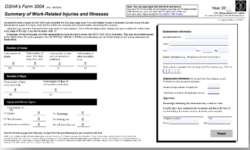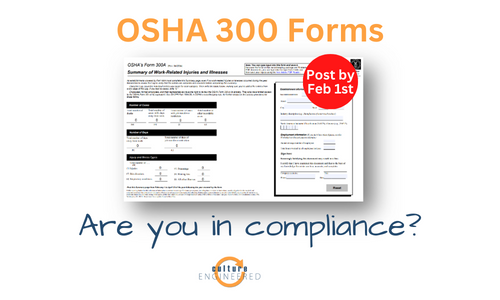Federal OSHA recordkeeping regulations require certain employers to maintain records of serious workplace injuries and illnesses using OSHA 300 Forms. These same employers are required to post OSHA Form 300A each February 1st through April 30th. Here is some helpful information to determine your company’s posting requirements.
Who is required to maintain OSHA 300 Logs (and post OSHA Form 300A)?
Most employers with 11 or more employees are required to record work-related injuries, using the OSHA 300 Log, unless partially exempt as a low-risk industry as classified by their NAICS code. See What industries are exempt from maintaining the OSHA 300 Log below for more information.
What is the OSHA 300 Log?
The OSHA 300 Log is used to capture all workplace recordable injuries and illness. Details related to the workplace injury/illness such as location, date, number of workdays missed or light duty (due to injury/illness), and nature of the injury/illness as well as name and job title of the person injured/ill, are included on the log. Details of the incident must be recorded on the OSHA 300 Log within seven (7) calendar days from when the employer is notified that the workplace injury/illness occurred.
What is OSHA Form 301?
Also known as the Injury and Illness Incident Report, the OSHA Form 301 is completed with each recordable incident. While the OSHA 300 Log and OSHA 300A forms summarize workplace injuries and illnesses specific to a location and period of time, the OSHA Form 301 is specific to each separate incident and therefore it (or an equivalent form) must be completed within seven (7) calendar days an employer is notified of a work-related injury or incident.
What is OSHA Form 300A?
 The OSHA Form 300A, also known as the Summary of Work-Related Injuries and Illnesses, is designed to bring more transparency to workplace safety. For this purpose, the OSHA Form 300A is completed annually at the end of each year. OSHA Form 300A is then verified and signed by a company executive and posted February 1 through April 30 for each year. Incidents specific to each location must be reflected on the posted form for each location if multiple sites and locations.
The OSHA Form 300A, also known as the Summary of Work-Related Injuries and Illnesses, is designed to bring more transparency to workplace safety. For this purpose, the OSHA Form 300A is completed annually at the end of each year. OSHA Form 300A is then verified and signed by a company executive and posted February 1 through April 30 for each year. Incidents specific to each location must be reflected on the posted form for each location if multiple sites and locations.
How are remote employee workplace injuries and illnesses reflected in OSHA Forms?
Recordable injuries or illnesses sustained by an employee at a remote location must be recorded on that employee’s home establishment’s OSHA 300 Forms. In cases where employees work at several different locations, or do not work at any establishment, each employee must be linked, for OSHA recordkeeping purposes, to one of the employer’s physical locations (ie, headquarters). In the event a company continuously conducts services or operations at a separate, single location for one year or longer, separate OSHA 300 Forms must be kept specific to that location.
How long must OSHA 300 Forms be kept?
OSHA 300 Forms must be kept for five (5) years.
What industries are exempt from maintaining the OSHA 300 Log (and posting OSHA Form 300A requirements)?
Unless otherwise advised by authorized federal or state agency, establishments classified as any of the following North American Industry Classification System (NAICS) codes are not required to keep OSHA injury and illness records. Note: All employers must report any workplace incident resulting in a fatality, in-patient hospitalization, amputation, or loss of eye to OSHA, regardless of number of employees or NAICS classification.
| NAICS Code | Industry Description |
| 4412 | Other Motor Vehicle Dealers |
| 4431 | Electronics and Appliance Stores |
| 4461 | Health and Personal Care Stores |
| 4471 | Gasoline Stations |
| 4481 | Clothing Stores |
| 4482 | Shoe Stores |
| 4483 | Jewelry, Luggage, and Leather Goods Stores |
| 4511 | Sporting Goods, Hobby, and Musical Instrument Stores |
| 4512 | Book, Periodical, and Music Stores |
| 4531 | Florists |
| 4532 | Office Supplies, Stationery, and Gift Stores |
| 4812 | Nonscheduled Air Transportation |
| 4861 | Pipeline Transportation of Crude Oil |
| 4862 | Pipeline Transportation of Natural Gas |
| 4869 | Other Pipeline Transportation |
| 4879 | Scenic and Sightseeing Transportation, Other |
| 4885 | Freight Transportation Arrangement |
| 5111 | Newspaper, Periodical, Book, and Directory Publishers |
| 5112 | Software Publishers |
| 5121 | Motion Picture and Video Industries |
| 5122 | Sound Recording Industries |
| 5151 | Radio and Television Broadcasting |
| 5172 | Wireless Telecommunications Carriers (except Satellite) |
| 5173 | Telecommunications Resellers |
| 5179 | Other Telecommunications |
| 5181 | Internet Service Providers and Web Search Portals |
| 5182 | Data Processing, Hosting, and Related Services |
| 5191 | Other Information Services |
| 5211 | Monetary Authorities – Central Bank |
| 5221 | Depository Credit Intermediation |
| 5222 | Nondepository Credit Intermediation |
| 5223 | Activities Related to Credit Intermediation |
| 5231 | Securities and Commodity Contracts Intermediation and Brokerage |
| 5232 | Securities and Commodity Exchanges |
| 5239 | Other Financial Investment Activities |
| 5241 | Insurance Carriers |
| 5242 | Agencies, Brokerages, and Other Insurance Related Activities |
| 5251 | Insurance and Employee Benefit Funds |
| 5259 | Other Investment Pools and Funds |
| 5312 | Offices of Real Estate Agents and Brokers |
| 5331 | Lessors of Nonfinancial Intangible Assets (except Copyrighted Works) |
| 5411 | Legal Services |
| 5412 | Accounting, Tax Preparation, Bookkeeping, and Payroll Services |
| 5413 | Architectural, Engineering, and Related Services |
| 5414 | Specialized Design Services |
| 5415 | Computer Systems Design and Related Services |
| 5416 | Management, Scientific, and Technical Consulting Services |
| 5417 | Scientific Research and Development Services |
| 5418 | Advertising and Related Services |
| 5511 | Management of Companies and Enterprises |
| 5611 | Office Administrative Services |
| 5614 | Business Support Services |
| 5615 | Travel Arrangement and Reservation Services |
| 5616 | Investigation and Security Services |
| 6111 | Elementary and Secondary Schools |
| 6112 | Junior Colleges |
| 6113 | Colleges, Universities, and Professional Schools |
| 6114 | Business Schools and Computer and Management Training |
| 6115 | Technical and Trade Schools |
| 6116 | Other Schools and Instruction |
| 6117 | Educational Support Services |
| 6211 | Offices of Physicians |
| 6212 | Offices of Dentists |
| 6213 | Offices of Other Health Practitioners |
| 6214 | Outpatient Care Centers |
| 6215 | Medical and Diagnostic Laboratories |
| 6244 | Child Day Care Services |
| 7114 | Agents and Managers for Artists, Athletes, Entertainers, and Other Public Figures |
| 7115 | Independent Artists, Writers, and Performers |
| 7213 | Rooming and Boarding Houses |
| 7221 | Full-Service Restaurants |
| 7222 | Limited-Service Eating Places |
| 7224 | Drinking Places (Alcoholic Beverages) |
| 8112 | Electronic and Precision Equipment Repair and Maintenance |
| 8114 | Personal and Household Goods Repair and Maintenance |
| 8121 | Personal Care Services |
| 8122 | Death Care Services |
| 8131 | Religious Organizations |
| 8132 | Grantmaking and Giving Services |
| 8133 | Social Advocacy Organizations |
| 8134 | Civic and Social Organizations |
| 8139 | Business, Professional, Labor, Political, and Similar Organizations |
What states are regulated by state plans?
Currently, there are 29 OSHA-approved Plans operated by US states and territories, 22 of which cover both private sector and state and local government workers, seven (7) covering only state and local government employees. State Plan agencies for these states and territories are as follows:
Where can I get OSHA 300 Forms?
Click here to access OSHA 300 Forms – PDF Fillable Format with instructions
Click here to access OSHA 300 Forms – MS Excel Format

